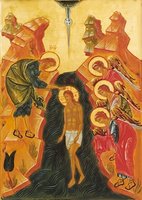The Power of the Cross by Michael Dubruiel is available in a free e-book version today.
The Cross of Christ Transforms. . . Our Priorities
In this is love, not that we loved God but that he loved us and sent his Son to be the expiation for our sins. Beloved, if God so loved us, we also ought to love one another. No man has ever seen God; if we love one another, God abides in us and his love is perfected in us. 1 JOHN 4:10–12
And the scribe said to him, “You are right, Teacher; you have truly said that he is one, and there is no other but he; and to love him with all the heart, and with all the understanding, and with all the strength, and to love one’s neighbor as oneself, is much more than all the burnt offerings and sacrifices.” And when Jesus saw that he answered wisely, he said to him, “You are not far from the kingdom of God.” MARK 12:32–34
A young girl dying of cancer befriended a famous archbishop. The bishop had a soft spot in his heart for children like her; his own niece had been diagnosed and he knew firsthand the agony both the patient and her parents faced. The archbishop had extended a standing invitation to the Protestant chaplain of the children’s hospital: If any Catholic child in the cancer ward wanted to see a priest, he should be summoned. So it happened that the archbishop was called to accompany this young cancer patient, Lorraine, in her last months of life. In time Lorraine came to trust the archbishop, and she shared with him her greatest trial. Her parents were angry with God because of her illness. She had been diagnosed when she was five years old, and had not yet made her First Communion. Would it be possible, she asked her friend, to receive the Eucharist before she died? After consulting with the parents, the archbishop prepared her personally for her first reconciliation, then celebrated Mass in her hospital room, confirming her and giving her First Communion. She lived only a short while longer. The archbishop said she had great faith but her constant worry was her parents. No doubt she was now interceding for them, that they might come to know the love that she had experienced in her suffering, that same suffering that had become an obstacle of faith to them.
This is the obstacle of the cross—when Our Lord died on the cross, some left believing that he was the Son of God, others left in utter disbelief. Yet the Scriptures tell us that Jesus’ death on the cross was a sign of God’s love.
--an excerpt from
The Power of the Cross by Michael Dubruiel is a book well-suited to daily reading during Lent.


















